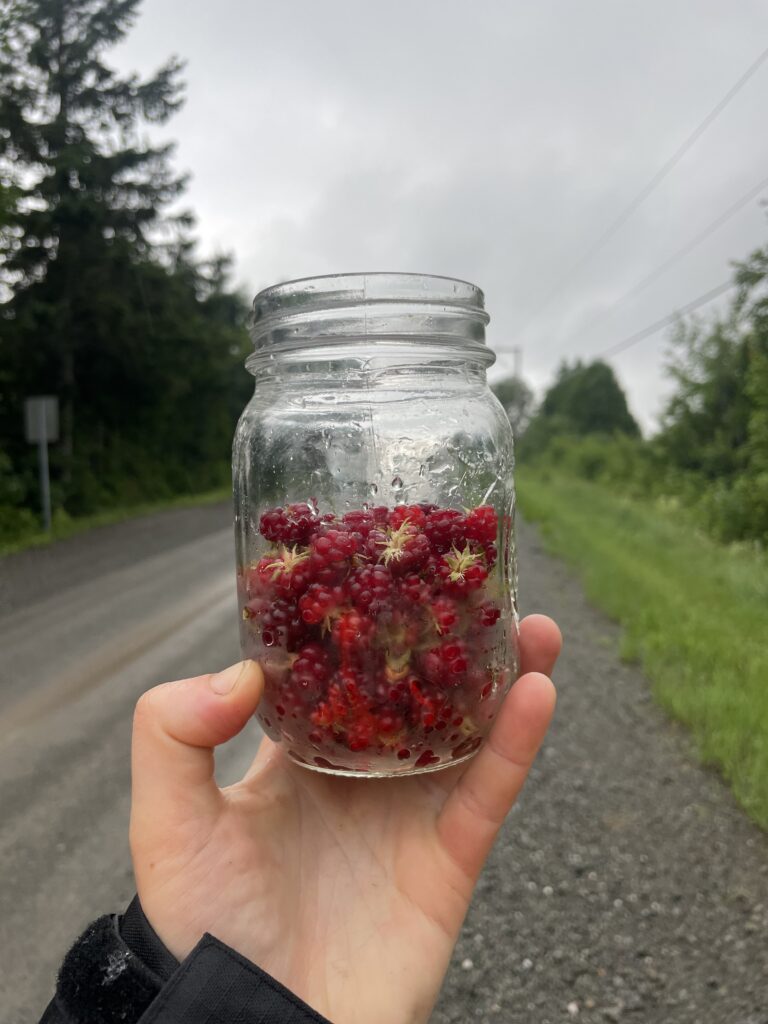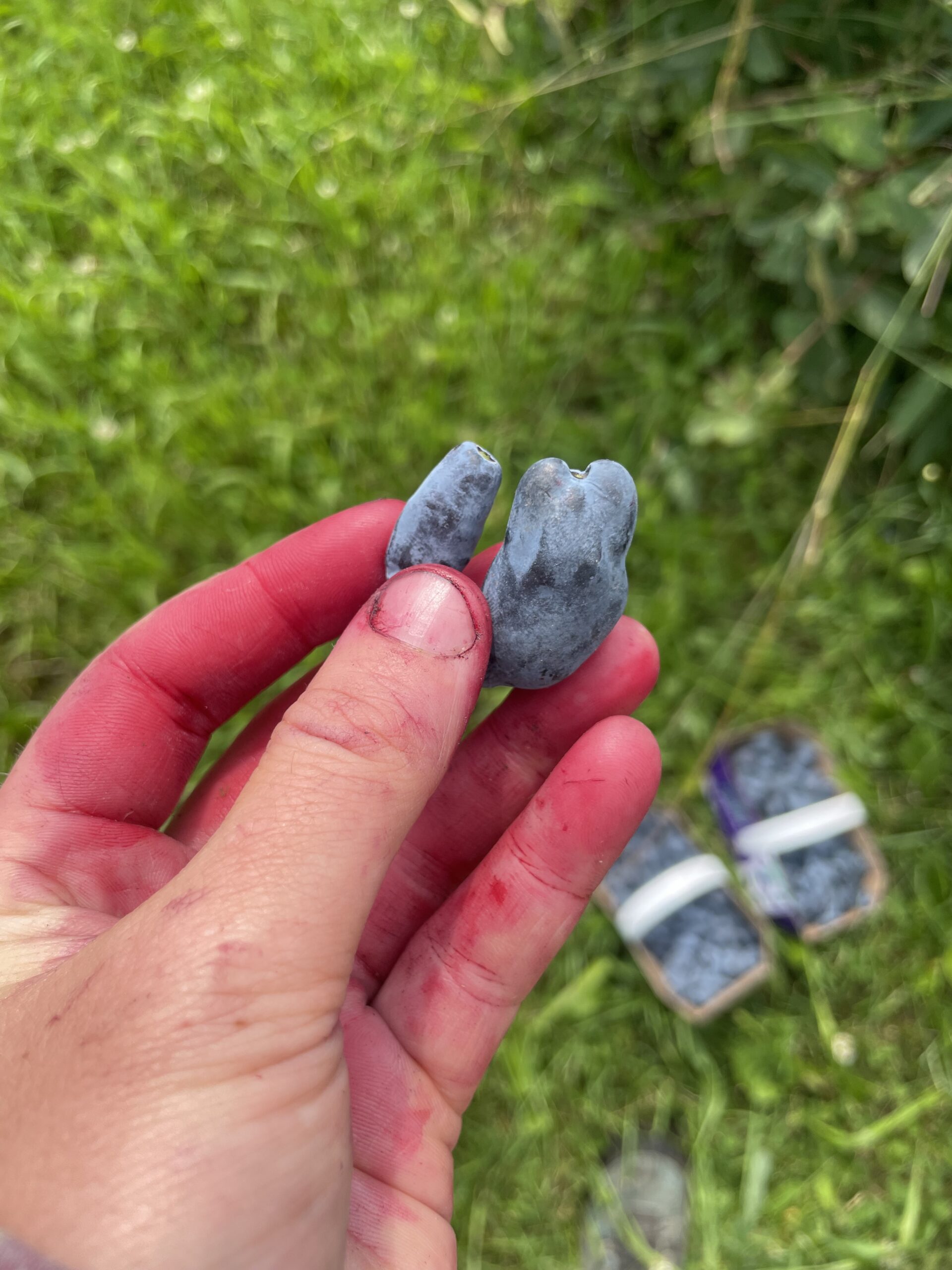I recently worked a summer job picking a niche berry called “camerise”, or haskap in English. They are a faded blue when still plumply attached to its branch, but turn a deep purple once touched (or pink to light purple, if they are not yet ripe). Sometimes, after hours of picking, they begin to remind me of tiny aubergines, their shape reminiscent with its long neck and set body. Other times, when I find a camerise that houses two individual berries inside of it, I come to think of them as peas, each ripe for the picking and joined by thousands of twins. I am told the flowers grow closely together, and so two connect to make one, like an embryo hosting two identical children. Sometimes the outside layer doesn’t fully closes up and you can get an intimate view inside of the fruit. Especially at the start of the picking season, I couldn’t resist the urge to put the berry up for closer inspection and admiration. It felt special watching nature at work from so close.
The berry is fragile and I find it doesn’t like to be touched more than once. After sliding them off into my carton basket, I think about how they now each carry my fingerprint, set in the thin protective layer I faded while picking them. I wonder if whoever buys them will notice. Will I too begin to inspect my store bought fruits for human trails? I find that it feels innately human to provide food for others, and now when viewing a filled up berry basket that I know to be picked by hand I think silently of the hunched backs, tired arms, sore knees, and sunburned necks of those who diligently picked them.
You have to be gentle while picking the haskap berry, cup your hand in such a way that you don’t accidentally squish them. Twist them off the branch instead of pulling them (after all, if they don’t want to leave, they’re not ready to). Once detached, they seem to lose some of their strength, as if their umbilical cords have been cut, and I have found it is often best to leave them as undisturbed as possible afterwards. Picking out the dried up leaves or tiny snails thrown into what they must think of as heaven, can result in the loss of multiple berries, and so it is best to check before adding anything to the basket. Taking more time initially, will always pay off afterwards.
Sometimes I get needy, and I rush to fill my hand with a mountain of fruit. Often, I lose more in the process than I gain and it reminds me to never grow too greedy and only take what I can carry. Other times, I disregard the ways in which the branches grow, forcing my hand through an empty space to reach the low hanging fruit that hangs heavy with its juice. This is usually when I catch a hold of a strong grassy weed that sets its way between my fingers, essentially pulling me to the ground and making it near impossible to transport all of the berries I now acquired back to my box. Here too, I am taught to be considerate and treat the winding branches as delicately as I can. I must follow their curves, instead of forcing them to comply to the straight shot of my arm. I even begin to appreciate the weeds that grow alongside them. The long grassy hay that grows tall and dense, but which allows itself to be gently tugged out of the earth as long as you make sure it doesn’t snap. There are purple flowers with finger-like leaves that grow around the plant, the top like vines searching for the next branch to settle on. My favorite are the “grass-like starwort”, a weed that grows thousands of little white flowers. When set against the deep purple camerise, I cannot help but think of a dark galaxy painted bright with a million glittering stars. On one of my final last days at work towards the end of summer, I still got to admire a full haksak bush littered with starwort, still blooming bright despite the end of the flower season nearing.

There is a certain companionship to picking fruits, and I have equally found this to be true in the cases of wild strawberries which grow so low to the ground you must almost lay down to be able to reach them (which I would, if it weren’t for the fact that they grow dense and so the chances of crushing some with your body are big, instead I spent hours on my knees or hunched over); wild blueberries that force you to tirelessly lift one branch after the other to run your fingers over the tiny berries so they softly fall into your hands; the raspberries that grow thick and deep pink, ready for the picking only when a gentle nudge forces them to leave their stems; and the Catherinettes that shoot out from their heavy-leafed mother like little red dots in a sea of green, but will begin to disappear under their shade once fully plump.
With each fruit, your body aches after some time, your neck bent down low, your hands wet with damp, your arms and ears covered with buzzing mosquitoes, your knees tired from carrying your weight, and your back tense. But despite all of it, there is no denying that there is infinite joy to watching your hand fill with mother’s labor. You take some, you give some, and your effort seems like a fair enough thing to trade. Besides, there is nothing that compares to the taste of truly fresh fruit. Sometimes it’s damp and cool, other times sun-kissed and hot. It tastes like the weather. Like the earth. Like life.


Leave a Reply